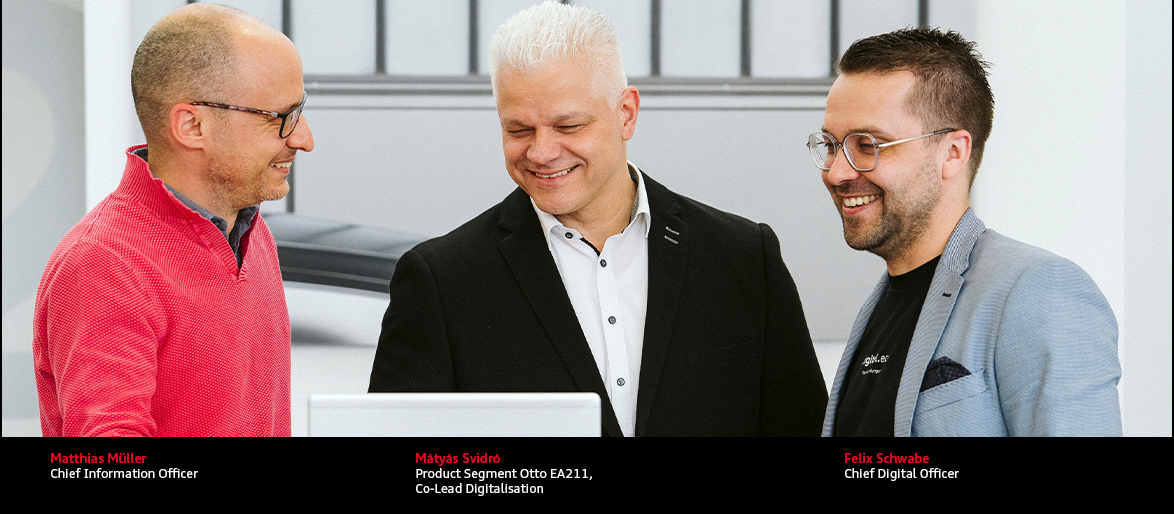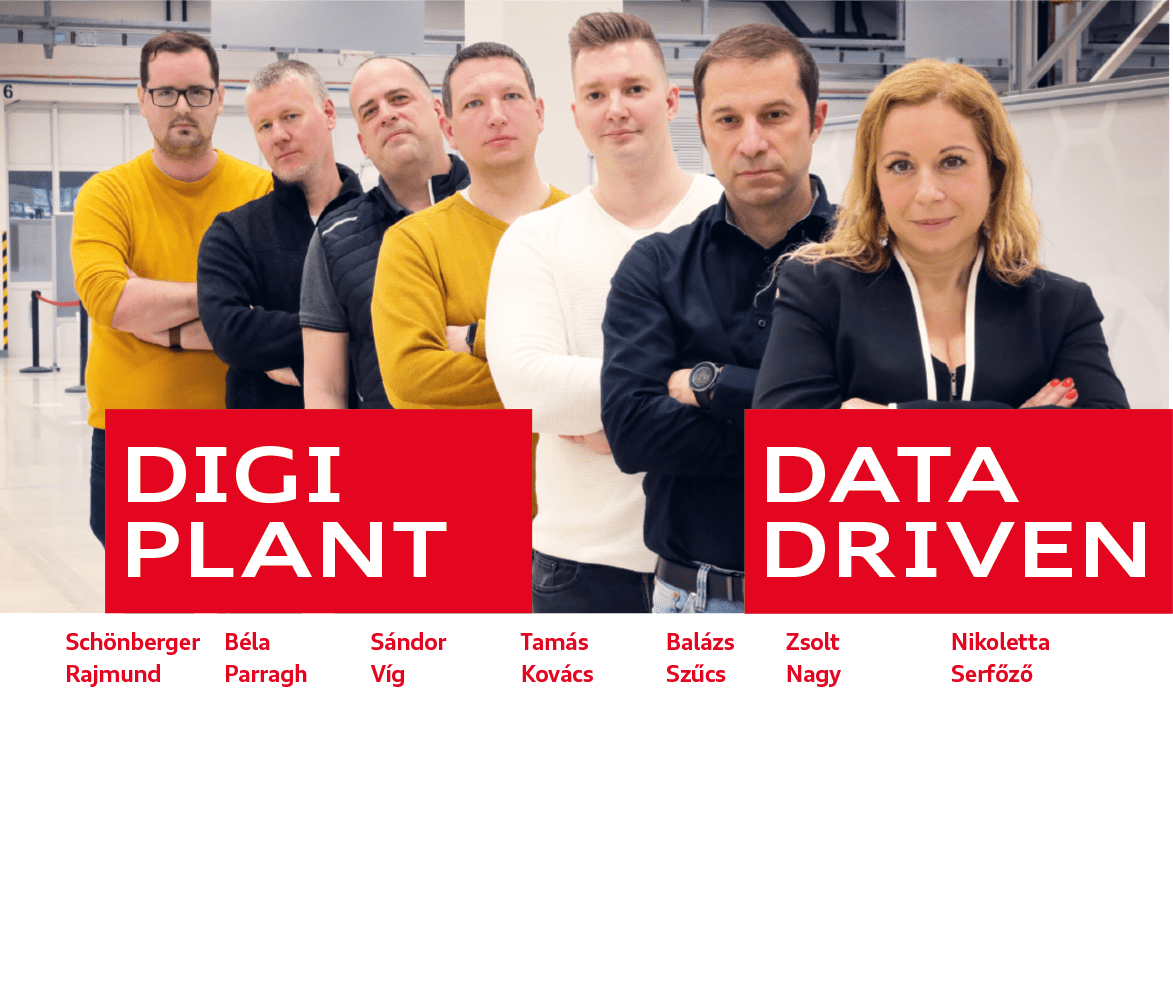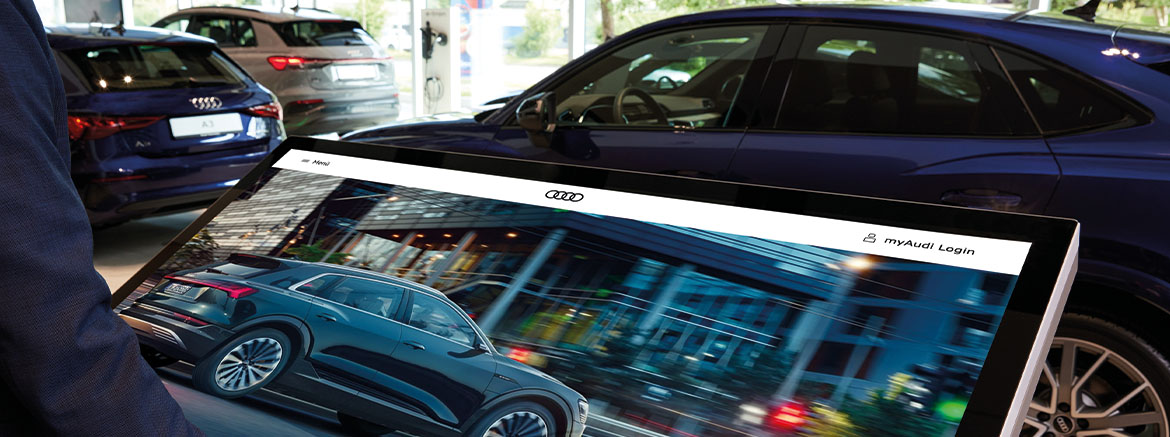
Intelligent and automated
The dynamic development and industrialisation of digitalisation presents a host of new opportunities for Audi Hungaria. We took another major step to becoming an intelligent company in 2023 and are introducing new initiatives with the help of Felix Schwabe, Mátyás Svidró and Matthias Müller, so let’s take a closer look at some developments from 2023.
At Audi Hungaria, digitalisation has several meanings: we define it as a process, a strategy and a philosophy all in one, sharing the common goal of making our operations more efficient and transparent with the help of data networks derived from machines and the organisation. However, in order for digitalisation to really be a successful and sustainable strategy, the entire organisation’s approach needs to be transformed on a step-by-step basis. Implementation needs to be planned systematically, during the course of which the areas and processes to be digitalised must be identified, while the possibilities for their implementation within the organisation need to be evaluated to ensure our not-so-distant objective of becoming a digital and intelligent company. CDO Felix Schwabe describes Audi Hungaria’s key digitalisation goals as follows: “What we have achieved in recent years in the automation of production processes, we can take to the next level through cutting-edge digitalisation and artificial intelligence solutions. Those processes that have until now been limited by human perception can increasingly be automated. This is borne out by those areas of application, such as the detection and removal of welding spatter or the quality control of welding points, which are currently in the experimental and preparatory phase, with the intention of putting them to regular use within the company. In addition to streamlining production processes, it will be increasingly possible to digitise the individual steps involved in processing knowledge and data. As robots revolutionised bodywork facilities, the next step is for us to automate regular and routine tasks and particularly complex processes with the help of digitalisation.”
The focus topics of 2023
In 2023, Audi Hungaria raised digitalisation to a new level in order to keep pace with the latest technological developments. We tested new digital solutions in our production and business processes, and continued their automation. We deployed artificial intelligence in vehicle production and quality control, while introducing low-code solutions to everyday business activities. In other words, instead of using custom programming code, we often utilise ready-made standard software modules, which we connect via intelligent meta data to produce the desired program behaviour – the result is a significant improvement in efficiency. A natural consequence of this process is the creation of new roles (data stewards, data specialists and data analysts), as well as the launch of corresponding training programs in the interests of ensuring we are able to apply the new tools and methods effectively. “We are working intensively on preparing our colleagues for the digital world, in other words, the digital transformation. In addition to implementing concrete digital solutions, our main objective is to promote enthusiasm and interest in digitalisation among our colleagues,” say Matthias Müller, Mátyás Svidró and Felix Schwabe, highlighting the importance of transforming the corporate culture.

What we have achieved
In 2023, Audi Hungaria made a significant step towards becoming an ‘agile company’. We also introduced agile processes to production planning and serial manufacturing projects with the clear goal of accelerating workflows, significantly reducing lead times and being able to respond flexibly to external changes. With the help of modern Process Mining methods, employees in accounting and procurement were able to implement process optimisations that resulted in concrete savings. In addition to this, an interdisciplinary Low Code Lab was founded in which production and IT teams jointly create modular digitalisation solutions. As a result, the efficiency of the processes in the various business areas grew significantly. In the course of the implementation of the digital solutions, we also benefited from the international competencies of the Volkswagen Group. One example of this is the implementation in accounting of Robotic Process Automation (RPA), which came about as a collaboration with Volkswagen Group Technology Solutions India. Along with the joint projects, experts from the various business areas have become increasingly networked – in groups such as the ‘Scrum Cafe’, ‘Big Data Community’ and ‘Digitalisation Project House’. We have also achieved significant results in the area of reporting: Audi Hungaria now has fully automated low-code solutions that mine and analyse data from the source systems before presenting it to each individual user in a personalised format.
What we can be proud of
“What I am personally very proud of is the creation of our digital ecosystem, digital.eco. We were absolute pioneers when we established an internal digital ecosystem within the company. Here, our colleagues can find all kinds of information, events, training courses, contact details and tools to do with all aspects of digitalisation from anywhere and around the clock,” Schwabe says of the achievement, before highlighting the potential of digitalisation. “A further goal is to introduce our colleagues to the topic of digitalisation in as interesting a way as possible. Our interactive digital newsletter is popular (digital.papers), our coworkers are able to encounter outside experts through digital.insights and the digital.podcast, the digital.brownbag presents events, and digital.breakfast is our way of elevating training and networking to a higher level. Whether it is access to the evoCloud data-driven enterprise management platform or searching for the ‘digital information breadcrumbs’ necessary for the next programming automation, our colleagues with an affinity for digitalisation (digital.rebels) will find it all in the ecosystem – all with entirely new formats. In essence, we wish to create a decentralised network that itself employs digital technologies and further develops them for the benefit of the organisation.”
In addition to promoting networking and knowledge growth, this has also produced concrete results in terms of projects. The Process Mining solution directly connected to our central system was quick to generate significant savings, while the automation realised with the help of Robotic Process Automation considerably reduced manual work in the area of inventory processing. It was also possible to noticeably cut delivery times for MVPs (Minimal Viable Products) when it comes to agile IT projects.
digiPlant
With the coordination of drive manufacturing, a special workshop was established in 2023 to test and implement new ideas related to digitalisation. From the very start, it operated according to an exciting ‘project within a project’ model. digiPlant is a collaboration that allows specialists from different disciplines to work together – from IT to production planning and engine manufacturing. We warmly welcome all those creative people who are collaborating on a project, whose thinking deviates somewhat from the conventional, and who wish to be part of something original. This methodology is designed to improve cooperation and knowledge transfer within the organisation. There are currently two projects underway, one of which is in the area of electric drives. The task: storing the data generated in the course of electric motor production for a prolonged period, which is subject to the legal requirement that it be made available in a replicable manner, while demonstrating that it cannot be manipulated. The other specialist collaboration is truly ‘our own baby’ and has to do with the image of the area. Students from three departments of the University of Győr’s Design Campus worked together with experts from scientific collaboration, architectural planning, Must- Win digitalisation and the digiPlant.

Data Driven Company@AH
In 2023, we laid the foundations for data-driven corporate culture at Audi Hungaria. We did this to allow decisions on all levels to be made on the basis of real-time data, and also to further optimise and automate processes. The Data Driven Company@AH program focuses on the development of technology solutions, the execution of organisational and process-level changes, and the development and expansion of the necessary capabilities. We set the workflow in motion by establishing the data strategy and defining the key roles, before successfully introducing the first Process Mining solution, which enables process optimisation founded on data analysis. In parallel with this, we also developed and tested our first integration solution, which will in future allow for the use of cloud-based data platforms (e.g. Microsoft Power Platform and AWS [Amazon Web Services]).

5G-charged industrial production
We can safely say that the 5G network is now in widespread use for everyday internet access. Audi Hungaria was the first company in the region to install a 5G network for industrial use, as we are convinced that data connections of this nature will be integral to the systems used in the manufacturing industry. During the experimental development process, the 5G network connects the ‘freshly made’ cars arriving at the company’s in-house testing track with its production and quality assurance system. For the testing period, experts from Audi Hungaria and the Széchenyi István University jointly developed the device required to provide access to the network and connect to the vehicles, while the cars of the future will be able to connect autonomously via an integrated 5G interface. The new system can easily be integrated with the existing IT infrastructure, is capable of significantly faster data transfer and considerably improves the efficiency of vehicle diagnostics as testing can be carried out anywhere within the company and is not tied to a particular location. In future, we will continue to test potential applications for industrial 5G networks. We have begun discussions on behalf of MAGE (the Hungarian Automotive Industry Association) with the Ministry for National Economy and HIPA, the Hungarian Investment Promotion Agency, in connection with the development of the system, and we are on the right path to putting the best possible technological and legal foundations in place in accordance with industry requirements.

